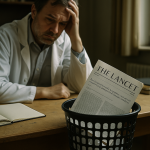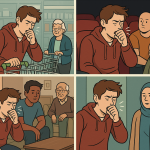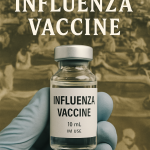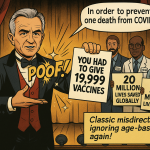Secretary of Health and Human Services Robert F. Kennedy, Jr. conducted a headline-making interview with Tucker Carlson on June 30, 2025. It was the kind of long, meandering conversation that can sound thoughtful on the surface — especially when delivered in a calm, confident voice. But scratch even slightly beneath that tone, and you’ll find something deeply unsettling.
RFK Jr. didn’t just question conventional wisdom. He misrepresented scientific facts. He promoted long-debunked conspiracy theories1 2. And worst of all, he did it from the bully pulpit of a federal cabinet position. That matters. Because when the Secretary of Health and Human Services speaks, people listen — and act.
To be fair, not everything he said was wrong. In fact, let’s start there.
✅ The Good Ideas — Because We Should Give Credit Where It’s Due
Despite the avalanche of misinformation in the interview, Kennedy made a few points that reflect real public health priorities. For example:
- Transparency in research: His call to publish protocols, make raw data public, and require replication reflects exactly what scientists have been advocating for years.
- Criticism of pharma advertising: He rightly pointed out that the U.S. is one of only two countries that allows direct-to-consumer pharmaceutical ads3 — something the American Medical Association has long opposed4.
- Reforming vaccine injury compensation: A faster, more transparent system would genuinely improve public trust and help the few people who experience rare adverse reactions5.
Those are sensible reforms. But when you’re the Secretary of Health and Human Services, saying a few true things is table stakes. What really matters is what you get dangerously wrong.
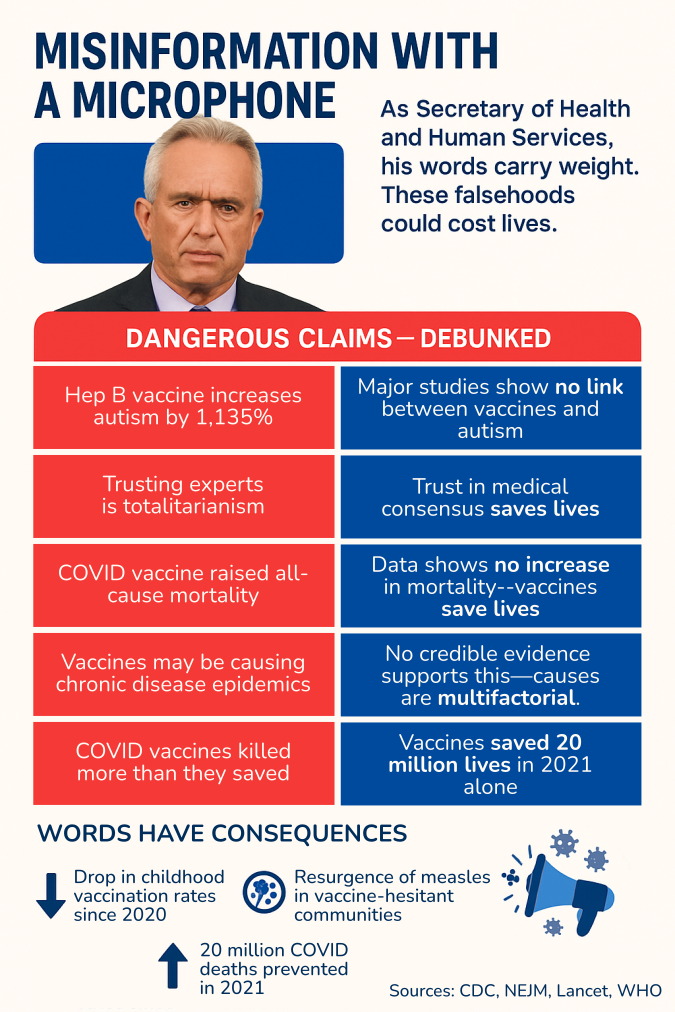
🧠 Why This Matters So Much
This isn’t about political points. It’s about public trust and real-world consequences. When someone in Kennedy’s position promotes falsehoods — especially about vaccines and public health — it doesn’t just confuse people. It drives behavior. And when that behavior includes skipping shots, ignoring real risks, or distrusting your doctor, people get sick who didn’t have to. Some of them die.
Let’s take a closer look at the most dangerous claims Kennedy made — and why they’re not just wrong, but potentially catastrophic.
❌ “They Found a 1,135% Elevated Risk of Autism from the Hepatitis B Vaccine”
“They looked at children who had received the hepatitis vaccine… and they found an 1,135% elevated risk of autism among the vaccinated children.”
This refers to a widely misunderstood 1999 CDC study led by Dr. Thomas Verstraeten. The study looked at potential links between vaccines containing thimerosal (a mercury-based preservative) and neurodevelopmental disorders. Early, incomplete data showed a weak signal — which prompted more study, not a cover-up. The final results, published in Pediatrics in 2003, showed no statistically significant link between thimerosal and autism.6
RFK Jr.’s version distorts this beyond recognition. The claim of a 1,135% increase is a cherry-picked, unadjusted number from preliminary drafts that ignored confounding factors. It was never a published finding.
The damage? Immense. Claims like this are why thousands of parents delay or skip childhood vaccinations, which has already led to outbreaks of measles and other preventable diseases.7
🧪 CDC: Vaccines and Autism — No Link
❌ “Trusting Experts Isn’t a Feature of Science — It’s a Feature of Totalitarianism”
“Trusting the experts is not a feature of science… It’s a feature of religion and it’s a feature of totalitarianism.”
This sounds provocative — and it is. But it’s also dangerously misleading. Science doesn’t ask for blind trust. It earns credibility through evidence, replication, peer review, and transparency.
Medical experts aren’t always right, but they work within systems that constantly correct errors. That’s how we know what works — and what doesn’t. Undermining expert consensus encourages people to trust internet rabbit holes and influencer speculation instead of doctors, epidemiologists, and health researchers.
This idea that “doing your own research” is better than trusting experts has already led people to reject vaccines, ignore safety recommendations, and fall prey to dangerous pseudoscience.8
🧪 NEJM: Why Trust in Science Matters
❌ “COVID Vaccines Had Higher All-Cause Mortality in Trials”
“There was 23% more deaths in the vaccinated group from all causes than in the placebo group.”9
This is a manipulative distortion of the Pfizer clinical trial data. In reality, there were 15 deaths in the vaccine group and 14 in the placebo group — a statistically meaningless difference. And none of the deaths were due to the vaccine itself. Most were from unrelated causes like cancer or heart disease.
Kennedy frames this tiny difference as a sign the vaccine may have killed more people than it saved. That’s not just wrong — it’s reckless fearmongering.
COVID-19 vaccines have saved millions of lives. Suggesting otherwise puts people at risk of dying from a virus we now know how to control.
🧪 Lancet: COVID-19 Vaccines and All-Cause Mortality
❌ “We’re the Sickest Nation in the World — Because of Vaccines”
“We have now this epidemic of immune dysregulation… and there’s no way to rule out vaccines as one of the key culprits.”
This is a textbook example of false dilemma thinking. Yes, autoimmune diseases, allergies, and other chronic conditions are on the rise10 11. But no, there’s zero credible evidence that routine childhood vaccines are to blame.
The real culprits? Genetics. Environmental exposure. Diet. Air pollution. Gut microbiome changes. Sedentary lifestyle. And more.
Blaming vaccines derails serious investigation into the real causes — and encourages people to refuse safe, effective vaccines that have kept children from dying of measles, pertussis, polio, and more.12
❌ “The COVID Vaccine Killed More Than It Saved”
“In order to prevent one death from COVID, you had to give 19,999 vaccines. If any of those vaccines were killing people, you would cancel out the effect.”
This claim takes an actual calculation (the number needed to vaccinate to prevent one COVID death) and twists it into an argument that vaccination wasn’t worth it. The implication: maybe the vaccine caused more harm than good.
In reality, global models show the opposite. A Lancet Infectious Diseases study estimated that COVID-19 vaccines saved 20 million lives in 2021 alone. Even rare serious side effects pale in comparison to the scale of lives saved.
To suggest otherwise, especially from the highest office in American public health, is not just wrong — it’s cruel.
👉 For more on this particular claim, come check out our new article in our “Geek Out With Us” series where we walk you through the math of how this real number can be so misleading.
🧪 Lancet: 20 Million Lives Saved by COVID-19 Vaccines
👥 You Don’t Have to Agree with Everything — But You Deserve the Truth
This isn’t about political tribes. It’s not about Democrats vs. Republicans. It’s about science vs. speculation, and facts vs. fear.
You don’t have to believe every word a public health agency says. Skepticism is healthy. But the antidote to flawed institutions isn’t conspiracy — it’s accountability, evidence, and higher standards.
When the Secretary of Health spreads misinformation, people don’t just lose trust. They lose guidance. They make different choices. And some of those choices end in tragedy.
We can — and must — do better.
Let’s expect more.
Let’s demand better.
Because when it comes to public health, “good enough” isn’t good enough. Lives are on the line.
- https://www.who.int/docs/default-source/coronaviruse/vaccine-misinformation-toolkit_desktop1.pdf ↩︎
- https://www.npr.org/2025/03/05/nx-s1-5285571/the-history-behind-an-enduring-public-health-falsehood-that-vaccines-cause-autism ↩︎
- https://www.statnews.com/2024/09/09/tv-drug-ads-pharma-industry/ ↩︎
- https://www.ama-assn.org/press-center/ama-press-releases/ama-calls-ban-dtc-ads-prescription-drugs-and-medical-devices ↩︎
- https://www.hrsa.gov/vaccine-compensation ↩︎
- https://www.cdc.gov/vaccine-safety/about/thimerosal.html ↩︎
- https://www.cdc.gov/measles/data-research/index.html ↩︎
- https://pmc.ncbi.nlm.nih.gov/articles/PMC9392429/ ↩︎
- https://www.fda.gov/media/144245/download ↩︎
- https://pmc.ncbi.nlm.nih.gov/articles/PMC9918670/ ↩︎
- https://www.cdc.gov/chronic-disease/ ↩︎
- https://www.who.int/news-room/fact-sheets/detail/immunization-coverage ↩︎
Last Updated on July 16, 2025



